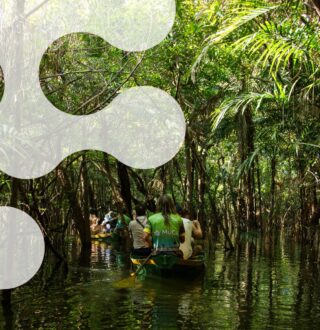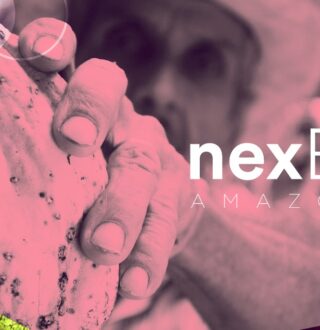
Vincent Neumann
Discover how your startup can be the game-changer for sustainable and efficient solutions in the heart of the Amazon rainforest.
nexBio Amazônia aims to bring together Swiss and Brazilian startups to work in areas of the Amazon bioeconomy. The main objective is to initiate sustainable, short-term, easy and quick-to-implement technological solutions that improve the sustainability and efficiency of existing production chains.
Find essential information about nexBio Amazônia: its purpose, who can participate, when it takes place, and what the program offers.
nexBio Amazônia offers an opportunity to understand the market and experience a unique context, landscape, and culture to develop their project or product and expand their network. Swissnex will provide full support and connections with Brazilian ecosystems, research centers, mentors, experts from the sector, and meetings with potential customers and partners.
Swiss and Brazilian technology based startups with potential to profit from revolutionizing sustainable supply chains of local high value forest products.
The second edition will take place between 21 July and 01 August 2025. Program to be confirmed depending on the facilities’ availability, length of the trip, planned activities, and other conditions.
The program will cover all costs.
nexBio Amazônia is an international innovation program that connects Swiss and Brazilian startups and researchers working in bioeconomy and sustainability with key actors in the Amazon region. The program focuses on fostering collaboration, promoting regenerative value chains, and supporting solutions that integrate biodiversity, technology, and community-based approaches.
Participants engage directly with local ecosystems, gaining insights into the complex dynamics of the Amazon’s bioeconomy and exploring new opportunities for sustainable business and research collaborations.
The program’s methodology was shaped through a co-creation workshop in Belém in November 2023, organized with Fapespa, ILMD Fiocruz Amazônia, Sesc Brasil, and the University of St. Gallen (HSG). Swissnex gathered 24 experts from government, academia, industry, and civil society to define the program’s thematic axes and identify key local challenges. The same methodology was successfully applied for the second edition of the program, when, during an exciting event in Manaus, with the support of Fapeam, 34 specialists from diverse fields, academia, NGOs, startups, government, and the private sector discussed and indicated fields such as biotechnology, engineering, environmental sciences, and economics to be central during the second edition.
nexBio Amazônia provides a platform for Swiss and Brazilian knowledge and technologies to be implemented and adapted locally through an intensive, hands-on program focused on driving sustainable innovation in the Amazon region
The 2025 edition of nexBio Amazônia will bring together Swiss and Brazilian startups and researchers in two key regions of Brazil: Pará and Amazonas, both at the heart of the Amazon rainforest and central to the development of bioeconomy initiatives.
Pará: With Belém and Santarém as a gateway, Pará is a strategic region for bioeconomy development, combining industrial infrastructure with access to rich biodiversity. The region is home to multiple research institutions, government initiatives, and community-driven enterprises working to develop sustainable and regenerative value chains in sectors like forest products, food, and cosmetics.
Amazonas: The state of Amazonas, with its capital Manaus, hosts one of the largest protected areas of tropical forest in the world. It has a long tradition of research and innovation linked to biodiversity, sustainable extraction, and traditional knowledge. Manaus is also home to industrial clusters that intersect with conservation efforts, making it a unique environment to explore the balance between economic activity and ecosystem preservation.
The 2025 edition of nexBio Amazônia will take place from July 21 to August 1, 2025, featuring a two-week, hands-on immersion across Pará and Amazonas:
Part 1 | Pará | July 21–27, 2025
Part 2 | Amazonas | July 28–August 1, 2025
The program will also include preparatory and follow-up sessions to support participants in developing their strategies and collaborations.
nexBio Amazônia is open to:
Selected participants must be available for the entire program period and willing to actively engage in collaborative activities and field visits.
Participants will be eligible for logistical support and stipends to help cover travel and accommodation expenses.
Look at the first edition of the Swiss-Brazilian program that welcomed 14 startups and 5 researchers for two weeks in Pará, Brazil.
On 21 July 2025, a delegation of Swiss and Brazilian startups and researchers will arrive in Pará to embark on a two-week journey across Belém, Santarém, and Manaus. The program aims to accelerate innovation and develop sustainable solutions within the existing bioeconomy value chain, fostering collaboration between Switzerland and Brazil in the Amazon region. Learn more about the program and meet the participants!
Mid-summer 2024, a group of fourteen different startups, mixing Brazilian and Swiss experts, toured the Para region in Northern Brazil. Across ten days spent meeting and connecting with the local community, the group gained valuable insights into the local biodiversity, bioeconomy, and people.
Discover how your startup can be the game-changer for sustainable and efficient solutions in the heart of the Amazon rainforest. Applications open January 14th!
Ready to revolutionize the future of bioeconomy in the Amazon? Calling all Swiss startups! Discover how your startup can be the game-changer for sustainable and efficient solutions in the heart of the Amazon rainforest
On 22 July, a delegation of 19 Swiss and Brazilian entrepreneurs and researchers arrive in Pará for a two-week program to develop efficient and sustainable new solutions in the existing bioeconomy production chain. Learn more and meet the participants!
The program was built in collaboration with some of Brazil’s most influential institutions and prepares a path for Swiss and Brazilian technologies to reach the region’s decision-making institutions and local farms. It is aligned with governmental and private sector initiatives and monetary incentives that strive towards a more sustainable circular bioeconomy.
Vincent Neumann
Pedro Capra







